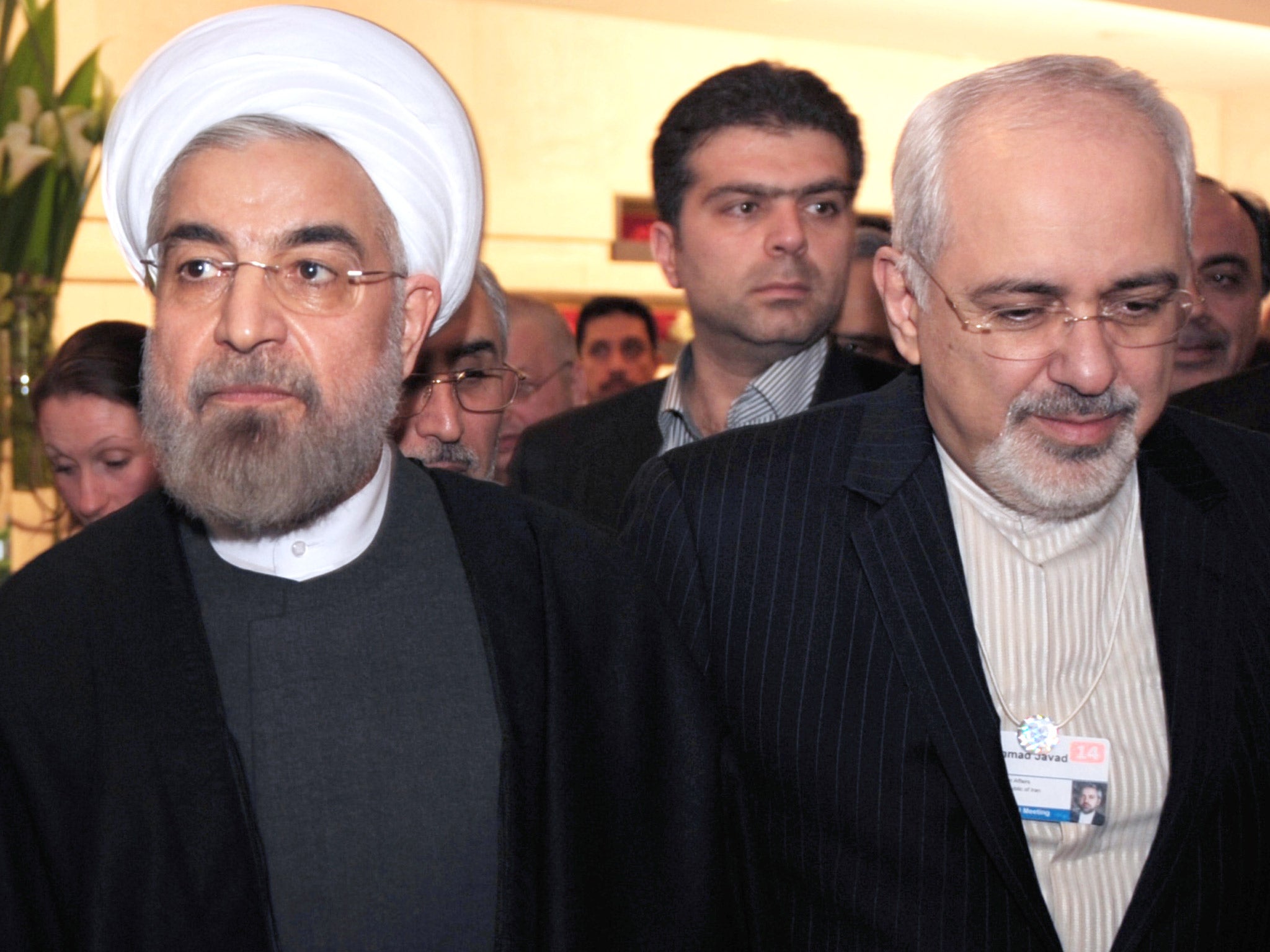Political conflict within Iran risks derailing nuclear agreement with the West
The tough line taken by Iranian politicians mirrors that of Republicans in the US Congress, who are pushing for more sanctions on Tehran

Your support helps us to tell the story
From reproductive rights to climate change to Big Tech, The Independent is on the ground when the story is developing. Whether it's investigating the financials of Elon Musk's pro-Trump PAC or producing our latest documentary, 'The A Word', which shines a light on the American women fighting for reproductive rights, we know how important it is to parse out the facts from the messaging.
At such a critical moment in US history, we need reporters on the ground. Your donation allows us to keep sending journalists to speak to both sides of the story.
The Independent is trusted by Americans across the entire political spectrum. And unlike many other quality news outlets, we choose not to lock Americans out of our reporting and analysis with paywalls. We believe quality journalism should be available to everyone, paid for by those who can afford it.
Your support makes all the difference.As Iran and world powers move closer to a long-term agreement over the Islamic republic’s nuclear activities, domestic political struggles are threatening to undermine the diplomatic process, which both the White House and the administration of Iran’s President, Hassan Rouhani, say is on the right track.
Despite wide public support and the approval of blocs of politicians and clerics, a range of opponents, mostly in Iran’s parliament, worry they could lose influence if a solution to the nuclear dispute is struck without their involvement.
The tough line taken by Iranian politicians mirrors that of Republicans in the US Congress, who are pushing for more sanctions on Tehran. President Obama has vowed to veto any new sanctions legislation while talks are ongoing.
Iran’s Foreign Minister, Mohammad Javad Zarif, told the German Council on Foreign Relations that, “with goodwill, we can reach an agreement within six months.” But sceptics in Tehran and Washington caution against rushing into a deal that could favour the other side.
With new talks scheduled to begin in Vienna on 18 February, these figures are becoming increasingly critical of the Islamic republic’s negotiating team.
“The West has not shown any serious intention to solve this issue that they created,” Vahid Ahmadi, a cleric and politician who sits on the parliament’s foreign policy commission, said in a session of parliament on Monday. “Although we will keep our commitments, we will never cross our red line, which is to maintain our nuclear achievements.”
Since the nuclear dossier was transferred to the control of Iran’s Foreign Ministry, the hardline press and conservative members of the parliament have sought more oversight in future rounds of nuclear talks, citing a lack of transparency as their biggest complaint.
“I am telling our nation that we are neither informed of foreign policies of this government nor of what they are doing domestically. They are doing whatever they like,” Mehdi Kouchakzadeh, a harsh critic of the government, said in parliament on Monday.
On Sunday, in a sign that conservatives may be regaining some political clout, members of the foreign policy commission said they had reached an agreement with the administration to add a member of parliament to the negotiating team, which will probably quiet some of the loudest critics among them.
Members of Iran’s political establishment who have long argued that the conflict with the United States is an existential one, and who consider normalised relations incongruous with decades of anti-Western policy and rhetoric, stand to lose the most if a compromise is reached.
For these hardliners, “the mere reaching of an agreement will cause an ideological crisis,” said the US-based Iran analyst Farideh Farhi.
Beyond the political arena, there are others profiting financially from sanctions on Iran who would lose if conditions are normalised.
“There are many vested interests that see little benefit in Iran opening up to the world. These interests are both political and economic, and sometimes both,” said Mohammad Ali Shabani, a Tehran-based analyst.
The most notorious case is that of Babak Zanjani, who amassed billions of dollars selling oil that illegally evaded sanctions. Zanjani is being held in Tehran’s Evin prison on corruption charges.
In addition to well-connected syndicates, countless smaller players are earning large returns on smuggling goods ranging from cars to basic foodstuffs. Currency speculators also fall into this category and have profited heavily from the discrepancy between official and street rates.
“Our people expect the President to expose those who are exploiting the sanctions to the nation and judiciary,” Kamaloddin Pir Moazen told fellow members of the parliament this week.
While identifying many of the individuals and entities illegally profiting from sanctions is difficult, there are also Iranian companies, including car makers, food producers and petrochemical firms, that benefit from the lack of competition caused by sanctions.
“It’s not only sanctions exploiters who see rapprochement as inopportune. Many sectors of the Iranian economy are essentially run as monopolies. A truly free market, fully integrated into the global economy, will lead to the downfall of these entities,” Mr Shabani said.
Despite these vocal opponents of compromise, there is consensus among the majority of the political establishment, as well as Iran’s business community, that finding a solution to the decade-long nuclear dispute would serve the country’s interests.
“The Iranians would like very much to have a deal, but they’re not willing to give up their sovereignty,” said Mohammad Marandi, a professor at Tehran University.
© The Washington Post
Join our commenting forum
Join thought-provoking conversations, follow other Independent readers and see their replies
Comments